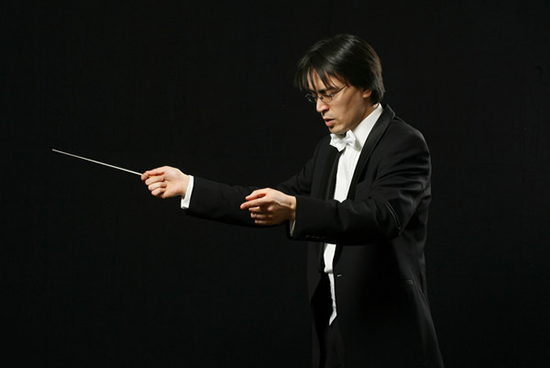CFA Musicians Perform Beethoven’s Ninth at Symphony Hall Tonight
BSO’s Masur to lead BU Symphony Orchestra, Symphonic Chorus

Ken-David Masur, Boston Symphony Orchestra assistant director, is the guest conductor as the BU Symphony Orchestra and Symphonic Chorus perform Beethoven’s Symphony No. 9 at CFA’s spring concert at Symphony Hall tonight. Photo courtesy of Ken-David Masur
Widely considered by many to be among the greatest compositions in the western musical canon, Beethoven’s Ninth Symphony will be performed tonight at Symphony Hall by the Boston University Symphony Orchestra and Symphonic Chorus. Ken-David Masur, assistant director of the Boston Symphony Orchestra, will be the guest conductor of the annual spring concert presented by the College of Fine Arts School of Music. The evening’s dramatic program will also feature Arnold Schoenberg’s Friede auf Erden, op. 13.
The evening’s soloists are soprano Ji Eun Park (CFA’14), alto Kylee Slee (CFA’16), tenor John David Nevergall (CFA’16), and bass Joseph Hubbard (CFA’17). Scott Allen Jarrett (CFA’99,’08) is CFA acting director of choral activities and of BU’s Symphonic Chorus, which is made up of nearly 150 student singers from all the BU schools.
Arguably one of the best known, most performed symphonic works in the world—its resounding “Ode to Joy” is recognized the world over—Beethoven’s Ninth is also one of the most debated and deconstructed works in classical music. “Probably half of humanity can hum the little ditty that serves as the theme of the choral finale—a setting of Friedrich Schiller’s revolutionary-era drinking song, ‘Ode to Joy,’” composer and Brahms biographer Jan Swafford writes in Slate. But the piece has not suffered from its ubiquity. Composed when the composer was almost completely deaf, the symphony’s ambiguities and mysteries inspired Swafford to dub it “the musical Mona Lisa.”
Schoenberg, the pioneering 20th-century composer who created what is known as the 12-tone method of composition, a way of manipulating a series of all 12 notes in the chromatic scale, is also credited with developing several groundbreaking theories of composition, now reflected in many contemporary works, but jarring to musical tastes prevailing at the time. He conceived of the composition of music without a key or tonal center. Born in 1874, he wrote Friede auf Erden (Peace on Earth) in 1907, and it represents one of the last pieces composed during his tonal period. The text for the piece is taken from a poem by Swiss writer Conrad Ferdinand Meyer.
Although it might not be immediately apparent to concertgoers, tonight’s program has a kind of continuity. “Where does a work as unfamiliar as Friede auf Erden leave us in anticipation of one of our society’s most popular and beloved works, Beethoven’s Ninth Symphony?” asks Brett Kostrzewski (CFA’18), in the program notes. Kostrzewski, instruction and reserves coordinator at Mugar Memorial Library, who is working toward a doctorate in historical musicology, says the composers’ texts “at least bear some resemblance to each other in their pleas for peace and harmony among humanity; musically, too, they both present unsatisfactory pictures of society that must be replaced by some more satisfactory motive: for Schoenberg the ‘peace on Earth’ refrain, for Beethoven the ‘Ode to Joy.’” He goes on to say that both pieces “draw upon texts from the prevailing cultural aesthetic that preceded the composers’ own: Beethoven’s early Romanticism utilizes an Enlightenment poem, Schoenberg’s early Modernism uses a late Romantic poem. The two pieces together, then, present a four-pronged call for peace that spans three centuries—four, if you include tonight’s performance.”
Masur, son of the late New York Philharmonic director Kurt Masur and a 1996 alum of the CFA Tanglewood Institute, has been critically hailed as “fearless, bold,” and a “life-force” (San Diego Union-Tribune) and “a brilliant and commanding conductor with unmistakable charisma” (Leipzig Volkszeitung). He began his 2015–16 season leading the BSO at its summer home, the Tanglewood Music Center in Lenox, Mass., in a program of Weber, Schubert, and Beethoven, followed by summer concerts in Toyko, leading the Yomiuri Nippon Symphony Orchestra in an all-orchestra program of Dvorak, Schubert, and Beethoven. Masur also continues in his post as principal guest conductor of the Munich Symphony, and he returns twice a year to lead the National Philharmonic of Russia.
The Boston University Symphony Orchestra and Boston University Symphonic Chorus concert, presented by the CFA School of Music, is tonight, Tuesday, April 26, at 8 p.m., at Boston Symphony Hall, 301 Massachusetts Ave., Boston. Seating is general admission. Tickets are $25; student rush tickets are $10, available at the door today from 10 a.m. to 6 p.m. Members of the BU community receive one free ticket at the door on the day of the performance. Purchase tickets here or call 617-266-1200.
The event will be available via a live webcast.
Comments & Discussion
Boston University moderates comments to facilitate an informed, substantive, civil conversation. Abusive, profane, self-promotional, misleading, incoherent or off-topic comments will be rejected. Moderators are staffed during regular business hours (EST) and can only accept comments written in English. Statistics or facts must include a citation or a link to the citation.